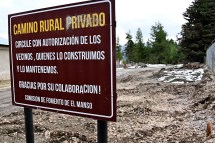The deputy elected by Río Negro Magdalena Odarda, an amparista in the cause for free access to Lago Escondido, received another legal setback in response. She intended to establish a tourist provider under the figure of Friend of the Court, but the Superior Court of Justice (STJ) not only did he reject her claim, but it also called her attention because she had no possibility of appealing the decision.

The Friend of the Court, or Amicus Curiae in Latin, admits the possibility that third parties unrelated to the cause may participate in certain judicial processes. to offer an opinion based on arguments of a legal, technical or scientific nature in order to help magistrates in matters of collective importance or general interest.
With that objective, the citizen Raúl Brigue appeared in the amparo for access to Lago Escondido. He invoked his status as a tourist and gastronomic provider but the STJ considered that it does not accredit any “specialization or competence” to enrich the deliberation on institutionally relevant issues.
Former Senator Odarda, through her lawyers, filed an appeal for reversal. However, the STJ ran her back with the law in hand and – words more, words less – told her that this procedure has no recourse.
It is the second judicial setback for the former head of the National Institute of Indigenous Affairs (INAI) in a short time. A few weeks ago, the STJ rejected the challenges formulated by Odarda, an amparista in the cause for free access to Lago Escondido. The sentence considered that natural judges cannot be separated from the process with the excuse of having denounced them when the file was already being processed.
In this process, the former senator also made a mistake: she was confused by saying that Judge Ricardo Apcarián had signed the ruling that enabled Alberto Weretilneck’s candidacy in 2019.
After analyzing the excuses, the highest court confirmed the integration for the treatment of the Lago Escondido case. The STJ will be formed for this file with the judges Ricardo Apcarian, Sergio Barotto, Cecilia Criado, Sandra Filipuzzi and María Luján Ignazi, the last two as surrogates.
Odarda had challenged Apcarian, Barotto and Sergio Ceci with different arguments. He affirmed that both Apcarian and Barotto signed the ruling that enabled Alberto Weretilneck’s candidacy as governor in 2019a decision that was finally overturned by the Supreme Court with divided votes. Consequently, the current governor Arabela Carreras was promoted.
The ruling of the STJ marks the first mistake of Odarda, a future provincial deputy. It is that Apcarian did not sign the sentence that enabled Weretilneck. Yes, Barotto and Liliana Piccinini, current members of the body, the retired judge Enrique Mansilla, Adriana Zaratiegui, also retired, and the surrogate Carlos Valverde did.
With that mistake, Odarda left Apcarian in the race to understand the Lago Escondido case. For his part, Barotto maintained that his intervention was “from an absolutely legal/constitutional level and such decision-making actions cannot constitute inappropriate connections or influences towards Mr. Weretilneck,” who is also not a party to the Bariloche amparo.
The ruling left a clear message: It would be arbitrary to set aside the natural judges, constitutionally designated, only with the excuse of having denounced them when the file was already being processed. For this they cited precedents of the Supreme Court.
Regarding Judge Sergio Ceci, recently appointed to the STJ, like Cecilia Criado, his functions as state prosecutor, head and deputy, and as legislative secretary were objected to. With this argument, Odarda maintained that the magistrate lacked independence.
The former senator’s attempt it didn’t prosper with Ceci either. The ruling considered that his public performance in different positions did not prevent him from intervening in the Lago Escondido case. However, the latter magistrate He argued that if there were so many suspicions, he offered his departure for reasons of decorum, which is a contemplated causal for excuses. In that last section, the sentence did accept the proposal of the former state prosecutor.
“Finally, and despite the foregoing, (Ceci) understands that there are reasons of decorum and delicacy that force him to excuse himself, considering that -even based on conceptual and chronological errors and prejudices of the plaintiff (Odarda)- the truth is that the functional scope and the way of developing the tasks carried out in the various public positions held from 1999 to date, may well raise doubts as to their judicial impartiality, hence their willingness to depart in pursuit of guaranteeing said value , in a case that has been pending for many years ”, arises from the sentence.
With this ruling, a new STJ was confirmed to resolve the amparo of Lago Escondido although the question flew over whether Odarda’s mistake was an intentional maneuver or, simply, he confused the signature of the magistrates. On Wednesday of last week, the STJ again took charge of marking the legal errors of the lawyer Odarda in the frustrated intervention of the Friend of the Court.

Supporting quality journalism is essential to maintain an informed society and build a solid democracy.
I want to subscribe